Iphigenia is a figure in Greek mythology.
Contents
Iphigenia may also refer to:
Iphigenia is a figure in Greek mythology.
Iphigenia may also refer to:

In Greek mythology, Iphigenia was a daughter of King Agamemnon and Queen Clytemnestra, and thus a princess of Mycenae.
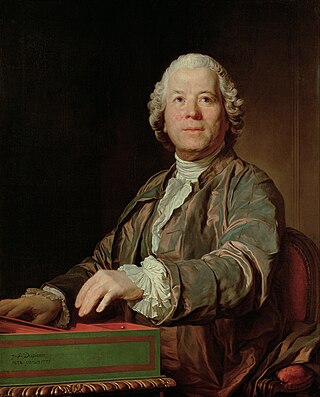
Christoph WillibaldGluck was a composer of Italian and French opera in the early classical period. Born in the Upper Palatinate and raised in Bohemia, both part of the Holy Roman Empire, he gained prominence at the Habsburg court at Vienna. There he brought about the practical reform of opera's dramaturgical practices for which many intellectuals had been campaigning. With a series of radical new works in the 1760s, among them Orfeo ed Euridice and Alceste, he broke the stranglehold that Metastasian opera seria had enjoyed for much of the century. Gluck introduced more drama by using orchestral recitative and cutting the usually long da capo aria. His later operas have half the length of a typical baroque opera. Future composers like Mozart, Schubert, Berlioz and Wagner revered Gluck.

Niccolò Piccinni was an Italian composer of symphonies, sacred music, chamber music, and opera. Although he is somewhat obscure today, Piccinni was one of the most popular composers of opera—particularly the Neapolitan opera buffa—of the Classical period.
Iphigénie en Tauride is a 1779 opera by Christoph Willibald Gluck in four acts. It was his fifth opera for the French stage. The libretto was written by Nicolas-François Guillard.

Iphigenia in Aulis or Iphigenia at Aulis is the last of the extant works by the playwright Euripides. Written between 408, after Orestes, and 406 BC, the year of Euripides' death, the play was first produced the following year in a trilogy with The Bacchae and Alcmaeon in Corinth by his son or nephew, Euripides the Younger, and won first place at the City Dionysia in Athens.
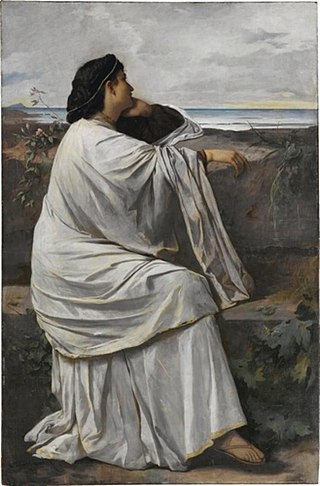
Iphigenia in Tauris is a drama by the playwright Euripides, written between 414 BC and 412 BC. It has much in common with another of Euripides's plays, Helen, as well as the lost play Andromeda, and is often described as a romance, a melodrama, a tragi-comedy or an escape play.

Iphigenia in Tauris is a reworking by Johann Wolfgang von Goethe of the ancient Greek tragedy Ἰφιγένεια ἐν Ταύροις by Euripides. Euripides' title means "Iphigenia among the Taurians", whereas Goethe's title means "Iphigenia in Taurica", the country of the Tauri.
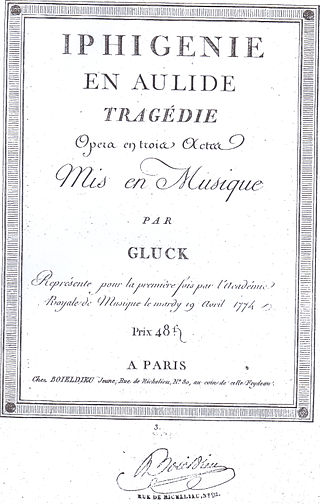
Iphigénie en Aulide is an opera in three acts by Christoph Willibald Gluck, the first work he wrote for the Paris stage. The libretto was written by François-Louis Gand Le Bland Du Roullet and was based on Jean Racine's tragedy Iphigénie, itself based on the play Iphigenia in Aulis by Euripides. It was premiered on 19 April 1774 by the Paris Opéra in the second Salle du Palais-Royal and revived in a slightly revised version the following year.

Joseph Legros, often also spelt Le Gros, was a French singer and composer of the 18th century. He is best remembered for his association with the composer Christoph Willibald Gluck and is usually regarded as the most prominent haute-contre of his generation, though his acting is reputed to have been mediocre.

Iphigénie is a dramatic tragedy in five acts written in alexandrine verse by the French playwright Jean Racine. It was first performed in the Orangerie in Versailles on August 18, 1674, as part of the fifth of the royal Divertissements de Versailles of Louis XIV to celebrate the conquest of Franche-Comté. Later in December it was triumphantly revived at the Hôtel de Bourgogne, home of the royal troupe of actors in Paris.

Nicolas-François Guillard was a French librettist. He was born in Chartres and died in Paris, the recipient of a government pension in recognition of his work writing librettos. He was also on Comité de Lecture of the Paris Opéra. One of the foremost of the French librettist of his generation, he wrote libretti for many noted composers of the day, including Salieri and in particular Sacchini. His most famous work is Iphigénie en Tauride, his first libretto, set by Gluck after the composer had initially rejected it. Gluck collaborated with Guillard to heavily recast the libretto, not only to suit Gluck's artistic preferences, but also to accommodate pre-existing music that Gluck borrowed, both from himself and from other composers, when composing the opera.
Ifigenia in Tauride can refer to:
Pilade may refer to:
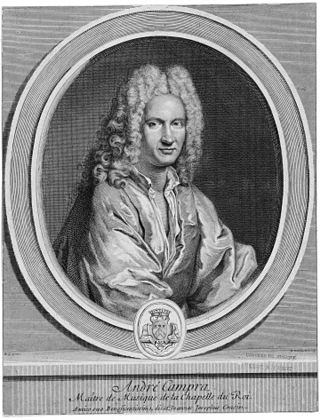
Iphigénie en Tauride is an opera by the French composers Henri Desmarets and André Campra. It takes the form of a tragédie en musique in a prologue and five acts. The libretto is by Joseph-François Duché de Vancy with additions by Antoine Danchet. Desmarets had begun work on the opera around 1696 but abandoned it when he was forced to go into exile in 1699. Campra and his regular librettist Danchet took up the piece and wrote the prologue, most of Act Five, two arias in Act One, an aria for Acts Two and Three, and two arias for the fourth act. The plot is ultimately based on Euripides' tragedy Iphigeneia in Tauris.

Iphigénie en Tauride is a tragédie lyrique in four acts by Niccolò Piccinni, which was first performed on 23 January 1781 by the Académie royale de musique in the second Salle du Palais-Royal. The opera's libretto, by Alphonse du Congé Dubreuil, is based on a play of the same name by Claude Guimond de La Touche, although the ultimate source was the tragedy Iphigeneia in Tauris by Euripides.
Johann Christoph Vogel was a German composer.
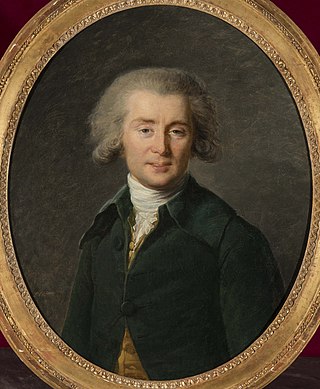
Andromaque is an opera in three acts by the composer André Ernest Modeste Grétry. The French libretto is an adaptation of Jean Racine's play Andromaque by Louis-Guillaume Pitra (1735-1818). It was first performed on 6 June 1780 by the Académie Royale de Musique in the second Salle du Palais-Royal. It was the only opera Grétry wrote in the form of a tragédie lyrique.
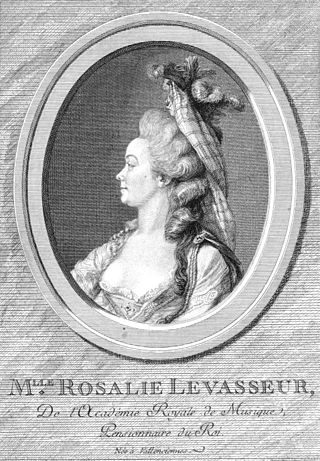
Marie-Rose-(Claude-)Josephe Levasseur, known in her day as Mademoiselle Rosalie, and later commonly referred to as Rosalie Levasseur was a French soprano who is best remembered for her work with the composer Christoph Willibald Gluck.
Henri Larrivée was a French opera singer. He was born in Lyon. His voice range was basse-taille. According to Fétis, Larrivée was working as an apprentice to a wigmaker when the head of the Paris Opéra, Rebel, noticed his talent for singing and hired him as a chorus member. He made his first solo appearance as a high priest in a 1755 revival of Rameau's Castor et Pollux. He was particularly associated with the works of Christoph Willibald Gluck, helping Gluck establish his "reform operas" in France. He found Gluck's rival, Niccolò Piccinni, less congenial but still worked with him on the premieres of operas including Roland (1778). After already getting a pension in 1779, he retired from the Académie Royale de Musique in 1786 and devoted most of the time he had left to live to tour around with his two daughters, Camille and Henriette, who played respectively harp and violin.
Ifigenia in Aulide may refer to: